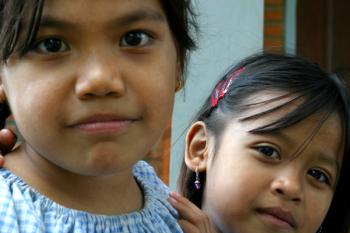The benefits of the booming tourism trade do not reach everyone

Two little girls from the village (photo: B. Neeleman)
Traditionally agriculture has been the main source of income and employment for the people of Bali. Although more recently tourism has taken over as the main source of income, agriculture continues to provide many with a livelihood. Many people who work on the land do not own it but lease it, and this means they often continue to live in poverty – recent estimates suggest that up to 60 per cent of farmers live below the poverty line. Given the booming tourist industry, many agricultural plots have been sold for touristic development and it has become practically impossible for farmers to buy land due to the rising prices. The situation of such farmers was so bad that the government introduced a sponsored transmigration programme which aimed to reduce the number of people living in overpopulated Bali and move them to other islands where they could farm more profitably.
An increasing number of children are losing parental care on the island. One of the reasons for this is the rising HIV/AIDS rate. The capital city of Denpasar has the highest number of cases of people with HIV/AIDS in the area. Most children who lose parental care end up in living in appalling conditions in orphanages around the island.
Providing families with the support they need
What we do in Bali

Strengthen families: In 2005, SOS Children's Villages Indonesia launched its first family strengthening programmes. These programmes, organised in collaboration with local partners, are intended to support families at risk and to encourage them to stay together. We offer health counselling, community support and psychological support. The activities are designed to ensure that children have access to essential services, such as education, health services and psycho-social support. Families are assisted with income generation and also receive help when dealing with the authorities. In addition, parenting skills and awareness of children's rights are improved.
Care for children who cannot live with their families: For children whose families can no longer take care of them SOS Children's Villages provides a loving home in SOS families. Smaller children attend kindergarten, where they are looked after and taught together with children from local families. Later they attend schools in the area, which helps them become part of the local community. The village also has a playground, a sports field and a garden where children can spend time together. A large orchard provides the SOS Children's Village with fresh fruit, and two small fish-ponds supply fresh fish. At SOS Children's Village Bali, the children are brought up according to the cultural traditions of the island.
Support for young people: As children grow older, we support them while they pursue further education or vocational training. We help young people take responsibility, plan their future and prepare for independent adult life.